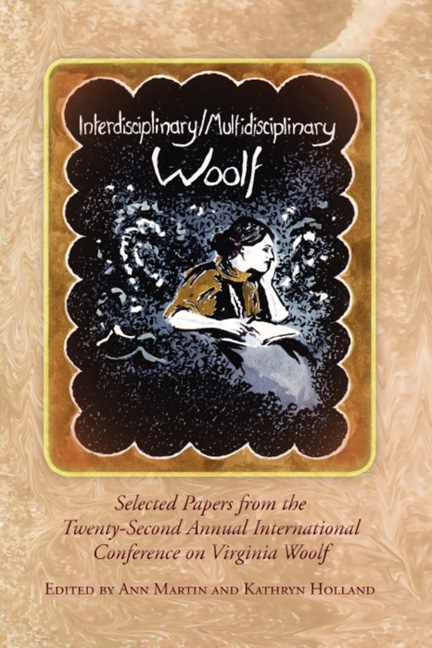Book contents
- Frontmatter
- Contents
- Introduction to Interdisciplinary/Multidisciplinary Woolf
- Acknowledgments
- List of Abbreviations
- History, Materiality, Multiplicity
- Patterns, Practices, Principles
- Art, Influence, Embodiment
- “Time has whizzed back an inch or two on its reel”: Relating Virginia Woolf and Emily Carr through Vintage Postcards, Lily Broscoe, Mrs. McNab, and the Cinematic Time of To the Lighthouse
- Speaking Citizen to Citizen in a Time of War: Miss La Trobe's Use of Parabasis in her Historical Pageant
- Work as Salvation: Eureka's Angel in the House, A Dircetor's Experience
- Drawing as Thinking: A Visual Response to To the Lighthouse
- Performing Feminism, Transmitting Affect: Isadora Duncan, Virginia Woolf, and the Politics of Movement
- Virginia Woolf and Clarice Lispector: Thinking Back Through Brazilian Mothers
- Mystical Gibberish or Renegade Discourse?: Poetic Language According to Orlando
- Selves and Others as Narrative Participants in Woolf's Novels
- Publishing, Politics, Publics
- Notes on Contributors
- Conference Program
Mystical Gibberish or Renegade Discourse?: Poetic Language According to Orlando
from Art, Influence, Embodiment
- Frontmatter
- Contents
- Introduction to Interdisciplinary/Multidisciplinary Woolf
- Acknowledgments
- List of Abbreviations
- History, Materiality, Multiplicity
- Patterns, Practices, Principles
- Art, Influence, Embodiment
- “Time has whizzed back an inch or two on its reel”: Relating Virginia Woolf and Emily Carr through Vintage Postcards, Lily Broscoe, Mrs. McNab, and the Cinematic Time of To the Lighthouse
- Speaking Citizen to Citizen in a Time of War: Miss La Trobe's Use of Parabasis in her Historical Pageant
- Work as Salvation: Eureka's Angel in the House, A Dircetor's Experience
- Drawing as Thinking: A Visual Response to To the Lighthouse
- Performing Feminism, Transmitting Affect: Isadora Duncan, Virginia Woolf, and the Politics of Movement
- Virginia Woolf and Clarice Lispector: Thinking Back Through Brazilian Mothers
- Mystical Gibberish or Renegade Discourse?: Poetic Language According to Orlando
- Selves and Others as Narrative Participants in Woolf's Novels
- Publishing, Politics, Publics
- Notes on Contributors
- Conference Program
Summary
In a recent biography of Melanie Klein, Julia Kristeva defends psychoanalysis as “an ethics of subjective emancipation” that defies identity politics by recognizing the “sexual polymorphism” in all persons (11). The statement alludes to Kristeva's own concept of the semiotic chora, a “receptacle” of drives and affects that bond mother and infant prior to the Oedipal complex and the advent of subjectivity (Powers 13). Kristeva discerns the semiotic rudiments of symbolic order in infantile speech, glossolalia, and poetry, utterances that violate the structures of language and so ostensibly elude paternal authority. Given her subversive tone, it is surprising that Kristeva often describes the semiotic in such a way as to hinder women's emancipation from the politics of gender. In About Chinese Women (1974), she cites the suicide of Virginia Woolf in a warning that women who write revolutionary literature may suffer the return of a primal identification with the mother and experience psychosis (41-43). Here Kristeva appears to divide the sexes, as writers, based on their disparate relations to the maternal and language. Identification with the mother threatens a woman's sense of identity within the symbolic, while autonomy is granted to the male writer, who sublimates this feared or “abject” mother in art.
Anticipating Kristeva, Woolf's Orlando describes a similar configuration of repression and poetic expression, tracing the poet's capacity to transform language to an archaic maternal principle. At the same time, Woolf's narrative challenges the notion that sexual identity determines one's relation to this principle and reveals the contingency of Kristeva's formulation on a paternal model of culture. Orlando gradually sheds the confines of subjectivity as prescribed by the Father to develop a more radical poetic practice than that envisioned by Kristeva. Whereas sublimation “imagine[s] the abject” to “thrust it aside” (Powers 16), the “cypher language” shared by Orlando and Shelmerdine neutralizes the prohibitive function of discourse and restores the fluid dynamics of the semiotic chora to the relations of adult subjects.
Following the opening pages of the novel, which foreground Orlando's beauty, ancestry, masculinity—in short, his integrity as subject—the protagonist confronts “abjection”: the disruption of “identity, system, order” by that which “does not respect borders, positions, rules” (Powers 4).
- Type
- Chapter
- Information
- Interdisciplinary/Multidisciplinary Woolf , pp. 196 - 200Publisher: Liverpool University PressPrint publication year: 2013



